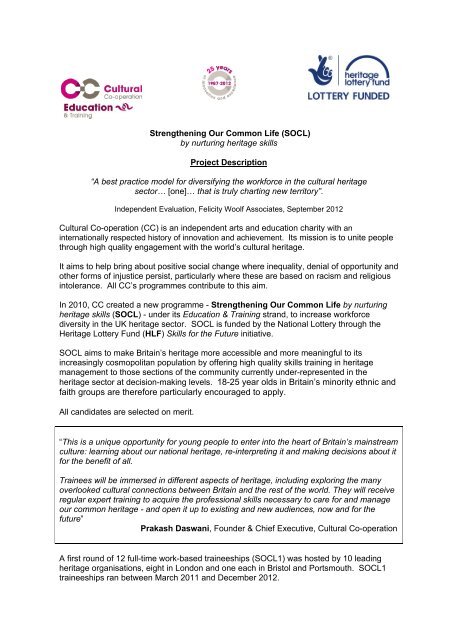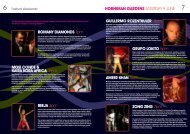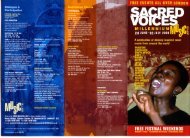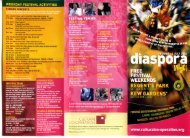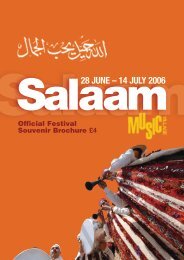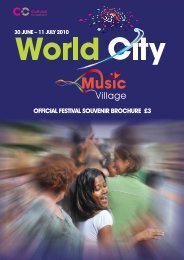further information on SOCL and application tips - Cultural Co ...
further information on SOCL and application tips - Cultural Co ...
further information on SOCL and application tips - Cultural Co ...
Create successful ePaper yourself
Turn your PDF publications into a flip-book with our unique Google optimized e-Paper software.
Strengthening Our <strong>Co</strong>mm<strong>on</strong> Life (<strong>SOCL</strong>)<br />
by nurturing heritage skills<br />
Project Descripti<strong>on</strong><br />
“A best practice model for diversifying the workforce in the cultural heritage<br />
sector… [<strong>on</strong>e]… that is truly charting new territory”.<br />
Independent Evaluati<strong>on</strong>, Felicity Woolf Associates, September 2012<br />
<strong>Cultural</strong> <strong>Co</strong>-operati<strong>on</strong> (CC) is an independent arts <strong>and</strong> educati<strong>on</strong> charity with an<br />
internati<strong>on</strong>ally respected history of innovati<strong>on</strong> <strong>and</strong> achievement. Its missi<strong>on</strong> is to unite people<br />
through high quality engagement with the world’s cultural heritage.<br />
It aims to help bring about positive social change where inequality, denial of opportunity <strong>and</strong><br />
other forms of injustice persist, particularly where these are based <strong>on</strong> racism <strong>and</strong> religious<br />
intolerance. All CC’s programmes c<strong>on</strong>tribute to this aim.<br />
In 2010, CC created a new programme - Strengthening Our <strong>Co</strong>mm<strong>on</strong> Life by nurturing<br />
heritage skills (<strong>SOCL</strong>) - under its Educati<strong>on</strong> & Training str<strong>and</strong>, to increase workforce<br />
diversity in the UK heritage sector. <strong>SOCL</strong> is funded by the Nati<strong>on</strong>al Lottery through the<br />
Heritage Lottery Fund (HLF) Skills for the Future initiative.<br />
<strong>SOCL</strong> aims to make Britain’s heritage more accessible <strong>and</strong> more meaningful to its<br />
increasingly cosmopolitan populati<strong>on</strong> by offering high quality skills training in heritage<br />
management to those secti<strong>on</strong>s of the community currently under-represented in the<br />
heritage sector at decisi<strong>on</strong>-making levels. 18-25 year olds in Britain’s minority ethnic <strong>and</strong><br />
faith groups are therefore particularly encouraged to apply.<br />
All c<strong>and</strong>idates are selected <strong>on</strong> merit.<br />
“This is a unique opportunity for young people to enter into the heart of Britain’s mainstream<br />
culture: learning about our nati<strong>on</strong>al heritage, re-interpreting it <strong>and</strong> making decisi<strong>on</strong>s about it<br />
for the benefit of all.<br />
Trainees will be immersed in different aspects of heritage, including exploring the many<br />
overlooked cultural c<strong>on</strong>necti<strong>on</strong>s between Britain <strong>and</strong> the rest of the world. They will receive<br />
regular expert training to acquire the professi<strong>on</strong>al skills necessary to care for <strong>and</strong> manage<br />
our comm<strong>on</strong> heritage - <strong>and</strong> open it up to existing <strong>and</strong> new audiences, now <strong>and</strong> for the<br />
future”<br />
Prakash Daswani, Founder & Chief Executive, <strong>Cultural</strong> <strong>Co</strong>-operati<strong>on</strong><br />
A first round of 12 full-time work-based traineeships (<strong>SOCL</strong>1) was hosted by 10 leading<br />
heritage organisati<strong>on</strong>s, eight in L<strong>on</strong>d<strong>on</strong> <strong>and</strong> <strong>on</strong>e each in Bristol <strong>and</strong> Portsmouth. <strong>SOCL</strong>1<br />
traineeships ran between March 2011 <strong>and</strong> December 2012.
You are applying for a full-time work-based traineeship in the sec<strong>on</strong>d round, <strong>SOCL</strong>2;<br />
traineeships to start between April 2013 <strong>and</strong> June 2013 <strong>and</strong> run for 12 m<strong>on</strong>ths each.<br />
<strong>SOCL</strong>2 which comprises 14 traineeships hosted by 14 top heritage organisati<strong>on</strong>s, in<br />
L<strong>on</strong>d<strong>on</strong>, Bristol, Manchester, Newcastle, Portsmouth <strong>and</strong> Manchester.<br />
<strong>SOCL</strong>2 Host Partner (HP) organisati<strong>on</strong>s are:<br />
• Bristol Museums, Galleries & Archives<br />
• British Museum<br />
• <strong>Cultural</strong> <strong>Co</strong>-operati<strong>on</strong><br />
• Foundling Museum<br />
• Garden Museum<br />
• Historic Royal Palaces<br />
• Horniman Museum<br />
• King’s <strong>Co</strong>llege L<strong>on</strong>d<strong>on</strong><br />
• Museum of L<strong>on</strong>d<strong>on</strong><br />
• Nati<strong>on</strong>al Museum of the Royal Navy & HMS Victory, Portsmouth<br />
• Nati<strong>on</strong>al Portrait Gallery<br />
• Nati<strong>on</strong>al Trust, Manchester<br />
• Southbank Centre<br />
• Tyne & Wear Museums<br />
Heritage<br />
HLF defines “heritage” as “what we value, want to share <strong>and</strong> pass <strong>on</strong>”. This definiti<strong>on</strong> has<br />
enabled a great widening in recent years of what “heritage” means.<br />
Today’s UK heritage sector is resp<strong>on</strong>sible for sustaining all aspects of the nati<strong>on</strong>’s heritage,<br />
for bringing it to life <strong>and</strong> for engaging all secti<strong>on</strong>s of the populati<strong>on</strong> in it.<br />
It does this through programmes <strong>and</strong> projects that encourage public participati<strong>on</strong>, learning<br />
<strong>and</strong> decisi<strong>on</strong>-making about heritage assets as diverse as: cultural objects (including fine<br />
<strong>and</strong> applied arts, design, ancient m<strong>on</strong>uments, sculpture); historic buildings; public spaces<br />
(including places of worship, parks, natural l<strong>and</strong>scapes); biodiversity; horticulture; archives;<br />
<strong>and</strong>, of course, the histories of individuals, families <strong>and</strong> communities, <strong>and</strong> their cherished<br />
cultural traditi<strong>on</strong>s <strong>and</strong> beliefs.<br />
There are many different stories to tell <strong>and</strong> in many different ways, including those that<br />
have historically been overlooked or denied to the detriment of the people of modern Britain<br />
as a whole.<br />
<strong>SOCL</strong>2 Placement<br />
Placements are full-time <strong>and</strong> run for 12 m<strong>on</strong>ths, starting between April <strong>and</strong> June 2013.<br />
Trainees receive a training grant of £13,500 gross per annum, towards living expenses <strong>and</strong><br />
local travel costs, exempt of tax <strong>and</strong> Nati<strong>on</strong>al Insurance, subject to an HMRC (Her<br />
Majesty’s Revenue & Customs) ruling due by March 2013.<br />
A <strong>SOCL</strong>2 placement will offer you a carefully planned selecti<strong>on</strong> of work-based activities that<br />
will enable you to acquire a range of heritage management skills.<br />
Activities are as diverse as the sector itself: developing imaginative new programmes for<br />
children <strong>and</strong> young people; planning <strong>and</strong> delivering exhibiti<strong>on</strong>s; exploring <strong>and</strong> c<strong>on</strong>serving
archives; managing precious collecti<strong>on</strong>s; helping the public to learn about historic buildings;<br />
venue operati<strong>on</strong>s; marketing; audience development <strong>and</strong> fundraising; <strong>and</strong> so <strong>on</strong>.<br />
The placements are underwritten by a new nati<strong>on</strong>ally recognized <strong>and</strong> fully accredited<br />
vocati<strong>on</strong>al qualificati<strong>on</strong> - the QCF Level 3 Diploma in <strong>Cultural</strong> Heritage – that all <strong>SOCL</strong><br />
trainees work to achieve. Placements also comprise: individual <strong>and</strong> group training in<br />
particular areas of need or interest; participati<strong>on</strong> in a series of facilitated peer support<br />
sessi<strong>on</strong>s (Acti<strong>on</strong> Learning Sets); <strong>and</strong> regular opportunities for all trainees to enjoy learning<br />
visits to <strong>on</strong>e another’s host locati<strong>on</strong>s.<br />
These traineeships do not c<strong>on</strong>stitute an offer or guarantee of employment <strong>on</strong>ce a<br />
placement is over. However, by developing a range of accredited heritage skills, backed up<br />
by the QCF Diploma, those who complete their placement successfully will have greatly<br />
enhanced their future employment prospects in the heritage sector. Ten of the 12 <strong>SOCL</strong>1<br />
trainees secured paid employment in the sector in a range of organisati<strong>on</strong>s including<br />
Lambeth Archives, Southbank Centre, Museum of L<strong>on</strong>d<strong>on</strong>, English Nati<strong>on</strong>al Opera,<br />
Nati<strong>on</strong>al museum of the Royal Navy <strong>and</strong> Bristol Museums, Galleries <strong>and</strong> Archives. CC<br />
c<strong>on</strong>tinues to support the other two trainees in their employment search.<br />
To find out more about the first round of <strong>SOCL</strong> trainees visit:<br />
http://www.culturalco-operati<strong>on</strong>.org/pages/<strong>SOCL</strong>1_Trainees<br />
For <str<strong>on</strong>g>further</str<strong>on</strong>g> <str<strong>on</strong>g>informati<strong>on</strong></str<strong>on</strong>g>, c<strong>on</strong>tact socl@culturalco-operati<strong>on</strong>.org marking your enquiry<br />
FAO Patrice Lawrence, Programme Manager, <strong>SOCL</strong>2.<br />
Applicati<strong>on</strong>s must be received by 2pm M<strong>on</strong>day 4 February. Interviews will take place<br />
between 4 March <strong>and</strong> 8 April.
Trainee Specificati<strong>on</strong><br />
The UK heritage sector recognizes the need for young people who can bring fresh new<br />
perspectives to help open it up for all to experience <strong>and</strong> enjoy. The work programme is<br />
varied <strong>and</strong> dem<strong>and</strong>ing <strong>and</strong> requires a very high level of commitment from the chosen<br />
trainee. Host Partners provide expert professi<strong>on</strong>al supervisi<strong>on</strong> <strong>and</strong> guidance <strong>and</strong> expect<br />
trainees to aspire to <strong>and</strong> achieve the highest st<strong>and</strong>ards.<br />
You need to use the Applicati<strong>on</strong> Form to dem<strong>on</strong>strate clearly that you can meet the<br />
Essential <strong>and</strong> Desirable requirements listed below. You are not expected to meet all the<br />
desirable st<strong>and</strong>ards, but do please explain how you have gained the <strong>on</strong>es that you feel<br />
most c<strong>on</strong>fident about.<br />
ESSENTIAL REQUIREMENTS<br />
• At least 5 GCSEs at A*- C grade including English <strong>and</strong> Mathematics or equivalent<br />
• Basic IT skills such as word processing, use of spreadsheets, email <strong>and</strong> internet-based<br />
browsing <strong>and</strong> research<br />
• Proficiency in spoken <strong>and</strong> written English<br />
• Proof of eligibility to live <strong>and</strong> work in the UK<br />
• At least 18 years of age<br />
• Willingness to undergo a Criminal Records Bureau or other security check if required<br />
Skills, experience <strong>and</strong> abilities:<br />
• A proven interest in culture <strong>and</strong> heritage<br />
• Relevant work experience, either paid, voluntary or as an intern<br />
• Excellent ability to communicate in writing or verbally with a range of different<br />
people<br />
• C<strong>on</strong>fident inter-pers<strong>on</strong>al <strong>and</strong> inter-cultural skills <strong>and</strong> sensitivity to the needs of<br />
others, particularly those from other cultures <strong>and</strong> faiths<br />
• Ability to think creatively <strong>and</strong> innovatively<br />
• Proven skills in problem-solving<br />
• Experience of working successfully in a team<br />
• Good organisati<strong>on</strong>al <strong>and</strong> administrative skills<br />
• Attenti<strong>on</strong> to detail <strong>and</strong> ability to analyse <str<strong>on</strong>g>informati<strong>on</strong></str<strong>on</strong>g><br />
• Ability to take resp<strong>on</strong>sibility for your own learning <strong>and</strong> work<br />
• Motivati<strong>on</strong>, determinati<strong>on</strong> <strong>and</strong> commitment to completi<strong>on</strong> of challenging projects<br />
DESIRABLE REQUIREMENTS<br />
• 2 A’ Levels or equivalent qualificati<strong>on</strong>s (e.g. BTEC or above)<br />
• Experience in a teaching or learning envir<strong>on</strong>ment<br />
• Experience working with groups of people <strong>and</strong>/or in a public-facing role<br />
• Problem-solving skills <strong>and</strong> ability to remain calm under pressure<br />
• Leadership skills<br />
• Ability to give <strong>and</strong> receive c<strong>on</strong>structive criticism<br />
• Experience of organising events<br />
• Experience of working with digital <strong>and</strong> social media
Top <strong>tips</strong> to c<strong>on</strong>sider when completing the Applicati<strong>on</strong> Form<br />
The first round of <strong>SOCL</strong> placements was highly over-subscribed; we anticipate that this<br />
round will be even more so. We hope these <strong>tips</strong> will help you approach the applicati<strong>on</strong> form<br />
<strong>and</strong> complete it as thoughtfully <strong>and</strong> as thoroughly as possible.<br />
1. Look at the <strong>Cultural</strong> <strong>Co</strong>-operati<strong>on</strong> website to find out more about what we do <strong>and</strong><br />
the history of the <strong>SOCL</strong> training programme, including the External Evaluati<strong>on</strong> of<br />
<strong>SOCL</strong>1. You will also find out what <strong>SOCL</strong> graduates <strong>and</strong> host partners gained from<br />
the experience.<br />
2. Explore some of the Host Partners’ websites. Even better, make a visit to some of<br />
them if you are able to. You could also visit heritage venues local to you. There is<br />
no guarantee that if you are shortlisted that you will be assigned to the host<br />
organisati<strong>on</strong> you visit, so it would be useful to visit a few.<br />
3. Reflect <strong>on</strong> the things that excite or engage you about their collecti<strong>on</strong>s or exhibiti<strong>on</strong>s<br />
<strong>and</strong> the stories these tell us about ourselves. How relevant do you think these are<br />
nowadays? What do you think it is about them that needs to be preserved, shared<br />
<strong>and</strong> passed <strong>on</strong> <strong>and</strong> what should be re-interpreted to engage new audiences? What<br />
barriers do you think exist that prevent more people of all backgrounds engaging<br />
with the sector more generally? What sort of things might help to resolve this?<br />
4. Think about the particular heritage management skills you want to acquire. Bear in<br />
mind that all the <strong>SOCL</strong>2 host organisati<strong>on</strong>s offer their selected trainees a wide<br />
range of highly transferable general heritage skills, as well as the opti<strong>on</strong> to choose a<br />
more specialized route, either from the start of the traineeship or as it progresses.<br />
5. Spend some time noting down the relevant skills, experience <strong>and</strong> knowledge you<br />
already have <strong>and</strong> how you gained them. Think about all areas of your life, including<br />
work, educati<strong>on</strong>, hobbies <strong>and</strong> volunteering.<br />
6. Have a brief look at the Qualificati<strong>on</strong>s <strong>and</strong> Curriculum Framework (QCF). If you are<br />
selected for a placement you will be working towards a Level 3 Diploma in <strong>Cultural</strong><br />
Heritage. http://register.ofqual.gov.uk/Qualificati<strong>on</strong>/Details/501_1694_0<br />
7. Be very explicit <strong>on</strong> the Applicati<strong>on</strong> Form, matching your skills, experience <strong>and</strong><br />
knowledge to the criteria <strong>on</strong> the Trainee Specificati<strong>on</strong>. Give c<strong>on</strong>crete examples - tell<br />
us what you have actually d<strong>on</strong>e or achieved as hard evidence of those skills.<br />
8. Address the Desirable skills you feel c<strong>on</strong>fident about as thoroughly as you can.<br />
9. Be sure that you are able <strong>and</strong> willing to dedicate the time <strong>and</strong> work the traineeship<br />
will entail – <strong>and</strong> can c<strong>on</strong>vince the interviewing panel of this should you reach that<br />
stage.<br />
10. Finally: check your completed Applicati<strong>on</strong> Form very carefully to ensure that: it is<br />
free of spelling <strong>and</strong> grammatical errors; you have stayed within the word count <strong>and</strong><br />
recorded the number of words you have used; all the details you provide are<br />
accurate.


